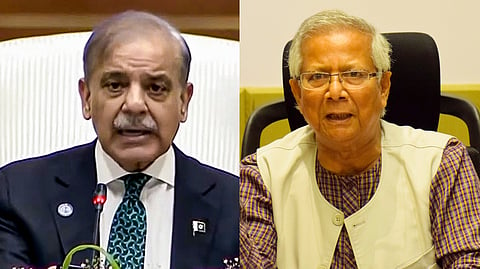

NEW DELHI: India on Thursday dismissed Pakistan Prime Minister Shehbaz Sharif's renewed offer for dialogue, firmly reiterating its long-held stance that "terrorism and talks cannot go together."
At the same time, India hit back at Bangladesh interim government’s Chief Adviser Mohammad Yunus, calling his allegations of Indian interference an attempt to shift blame for internal unrest and called for early and inclusive elections in the neighbouring country.
Speaking alongside Iranian President Masoud Pezeshkian in Tehran earlier this week, Sharif said: "We want to resolve all disputes, including the Kashmir issue and the water issue, through negotiations and are also ready to talk to our neighbour on trade and counter-terrorism."
India, however, dismissed the Pakistan PM's offer, with Ministry of External Affairs (MEA) spokesperson Randhir Jaiswal asserting that "terrorism and talks cannot go together."
"As far as our engagement with Pakistan is concerned, our stand has been clear. Any engagement has to be bilateral. We would like to reiterate that terrorism and talks cannot go together," Jaiswal said at the weekly briefing.
"They need to hand over to India, noted terrorists, whose records and list we submitted to them some years ago. Talks on Jammu and Kashmir will be held only on the vacating of PoK (Pakistan occupied Kashmir) and when Pakistan hands over the territory to us," he added.
'IWT will reamain in abeyance'
India also emphasied that the status of the Indus Waters Treaty, suspended in the aftermath of the April 22 Pahalgam terror attack, is linked to Pakistan’s actions on cross-border terrorism.
"As far as the Indus Water Treaty is concerned, it will remain in abeyance till the time Pakistan credibly and irrevocably abjures its support to cross-border terrorism. Just like Prime Minister Narendra Modi says, terror and talks cannot go together, terror and trade cannot go together, and water and blood cannot flow together," Jaiswal added.
Notably, India on April 23 announced a raft of punitive measures against Pakistan including suspension of the Indus Waters Treaty, a day after the Pahalgam terror attack that killed 26 people.
India also carried out 'Operation Sindoor', a series of precision strikes on nine terror infrastructures early on May 7 in response to the Pahalgam terror attack. Following the Indian action, Pakistan attempted to attack Indian military bases on May 8, 9 and 10.
The Pakistani attempts were strongly responded to by the Indian side by inflicting heavy damages to a number of key Pakistani military installations including air bases, air defence systems, command and control centres and radar sites.
Foreign Secretary Vikram Misri on May 10 announced that India and Pakistan reached an understanding to stop all firings and military actions on land, air and sea, with immediate effect.
Yunus 'trying to deflect attention'
Meanwhile, turning to Bangladesh, the MEA spokesperson dismissed allegations by Mohammad Yunus that India was destabilising the country. "The responsibility for law and order and governance issues lies entirely with that government," he said.
"If someone says that external factors or someone else is to blame for the disturbances, it appears that they are trying to deflect attention from the real issue and shift the blame onto others. Such statements do not solve the problem; they seem like an attempt to avoid accountability," he added.
Yunus had earlier claimed there were "relentless efforts to destabilise Bangladesh", both "internally and externally", hinting at India’s role.
Meanwhile, the MEA spokesperson also called for holidng early and inclusive elections in Bangladesh.
Notably, Protests intensified across Bangladesh this week as activists and opposition parties, including Khaleda Zia’s Bangladesh Nationalist Party (BNP), demanded elections by December. The BNP accused the Yunus-led interim government of using “delay tactics” and pushing “so-called reforms” to undermine democratic processes.
Tens of thousands of youths rallied in Dhaka in a show of strength against the newly formed National Citizen Party (NCP), a student-led outfit backed by Yunus. The NCP emerged from last year’s deadly protests under the Students Against Discrimination (SAD) platform and maintains that elections should be delayed until key reforms are enacted. During a visit to Japan on Wednesday, Yunus said elections would be held between December this year and June next year, depending on the pace of reforms.